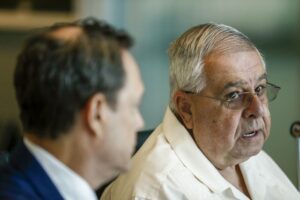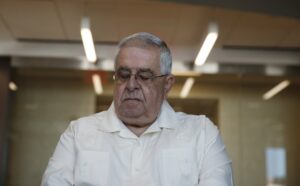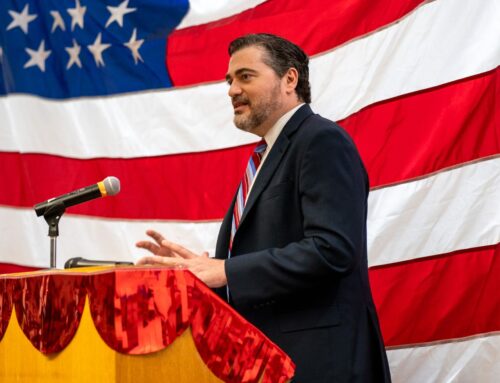By Gisela Salomon, AP | September 25, 2019José Ramón López Regueiro speaks during a press conference in Coral Gables, Florida on Wednesday, September 25, 2019. The Cuban exile has filed a Helms-Burton suit against American Airlines and LATAM Airlines Group. (AP Photo/Brynn Anderson)
(Translated from Spanish)
CORAL GABLES, Florida, USA (AP) – A Cuban exile sued American Airlines and LATAM Airlines Group on Wednesday, alleging that they operate illegally at the José Martí International Airport, which the Cuban government confiscated from his family after the 1959 revolution.
José Ramón López Regueiro filed the lawsuit in the federal courts of Miami and requested that the two airlines stop operating their passenger and cargo planes at that air station and pay an economic compensation that could reach up to $3 billion dollars.
He also notified more than 50 airlines that work at the Havana airport to stop operating there or else they will face similar demands. Among those companies are Jet Blue and Delta, both American companies.
“I feel very satisfied with the mere fact of having filed the lawsuit,” said López Regueiro, a 66-year-old retiree who left Cuba in 1989. “Unfortunately, we have had to wait 60 years, but finally justice will be done,” he said at a press conference he held with his lawyers in the city of Coral Gables.
This lawsuit adds to several more against European, Canadian and American companies that do business on properties that were confiscated in Cuba after the Trump administration triggered a provision of the embargo on Cuba known as Title III of the Helms-Burton Act this year. Among other companies that have been sued are the Spanish hotel chains Meliá, Iberostar and Barceló; the French Accor, the American cruise company Carnival, and the online tourism companies Expedia and Booking.
LATAM, whose headquarters are in Chile, would be the first defendant company with headquarters in Latin America.
Title III of the regulations authorizes Americans and Cubans who have been naturalized as Americans to file suit against any company that “traffics” in properties confiscated by the island’s government after the revolution.
Since the Helms-Burton Act was passed in 1996, all American presidents had suspended Title III due to objections by Washington’s allies with business in Cuba and for its possible effects on future negotiations of agreements between the United States and Cuba. The regulations include exceptions for residential properties, properties valued at less than $50,000, or related to travel to Cuba considered legal.
Its activation was expected to generate hundreds of lawsuits, in addition to commercial battles between Washington and countries such as Spain, France and Britain, but for now a limited amount of legal actions have been filed.
For lawyer Don Hayden, an expert in Helms-Burton law, López Regueiro’s lawsuit could prompt some airlines to restrict travel to Cuba.
“These new lawsuits indicate that we could see a greater number of lawsuits going forward,” Hayden told The Associated Press.
After the lawsuit was made public, American Airlines said its services to Cuba have been authorized by the US government and assured that legal trips to the island have been exempted from Chapter III of the Helms Burton Act.
“We are going to review this demand in detail and vigorously defend our service to Cuba,” Alexis Aran Coello, an American spokesman, said in a written statement sent to AP. LATAM did not respond to an email from AP seeking comment.
López Regueiro said he is the legal owner of the main airport in Cuba, which was confiscated from his father along with the Cuban airline company Aviation and a hotel in the city of Cienfuegos, on the south coast of the island.
“This lawsuit represents a cause of injustice,” said his lawyer, Andrés Rivero. If other airlines “want to avoid future demands, they must stop operating at the José Martí International Airport. If not, they will face lawsuits,” he warned.





